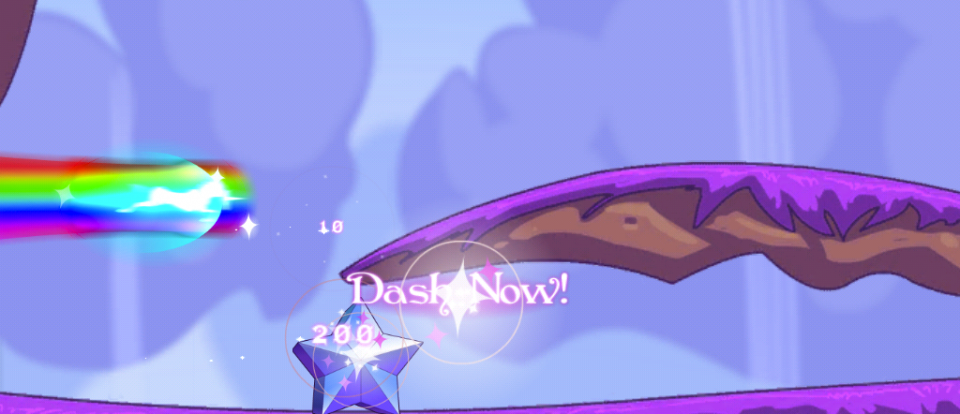
Scott Stoddard: Interview
Scott Stoddard tells us about the development of Robot Unicorn Attack and how he measures a game's success.
ABOUT THE AUTHOR
Interviewed by Pete HawkesScott Stoddard is a game designer with several Flash titles to his name, but he was propelled to popularity with his Robot Unicorn Attack, which boasts an incredible number of plays and a devoted fan community. Before his lecture and workshop at UCLA on February 17 and 18, Scott tells us about Robot Unicorn‘s development and how he measures a game’s success.
* * * * *
How did you become a game designer?
I was into traditional art growing up, then got into computer animation as I was finishing high school. I planned on going into movies, but in college I learned Flash at a part time job and started making games. I fell in love with the experience of interacting with my creations. From there I got a day job making console games while I continued developing indie flash games on the side.
What other games have you made aside from Robot Unicorn Attack?
Besides Robot Unicorn, the most popular have been Mad Shark, Capoeira Fighter 3, and Guardians of Altarris.
Mad sharks, cyborg livestock, Capoeira fighters, robot unicorns? Where do you draw inspiration for your games?
My games are inspired by things I’m passionate about. I’ve loved sharks since I was a little kid, and I’d always wondered what it would be like to be a shark. Mad Shark lets you do that. I learned Capoeira in college while I was studying animation, and combined it with my love for the Street Fighter games to do my own take on the fighting genre.
And of course I’ve loved video games since I was a kid. Many of my games are riffs off games I played on my Nintendo and Super Nintendo.
Do you collaborate with others when you design and build games?
The original kernel is usually mine, but I’ve had great help from friends, especially my painter and gamer friend Adam Ford, musician friend Ethan Halvorsen, and talented artists / writers Trent and Melissa Halvorsen. Having good talented friends with great taste in games is a must for any developer.
Why Robot Unicorn Attack? Where did the idea originate?
I had a two month window to wrap up freelance work before starting with ChAIR Entertainment (creators of Shadow Complex and Infinity Blade). Adult Swim wanted me to fit in one last game, and I wanted to try out some game play ideas inspired by Adam Atomic’s Canabalt and a talk I had just heard on flow theory.
The art was inspired by my fetish for so-bad-it’s-good fantasy art. Robot unicorns are a sorely underutilized icon, and rainbows really do make everything better.
How did you get permission to use the Eraser song?
Working with Adult Swim has its perks. They handled the business side and costs for licensing the song. From what I’ve read Erasure has added lots of new fans because of the game, so I think they’re glad they let us use the song.
Why do you think Robot Unicorn Attack is so popular?
The concept is so out there, I think people sort of felt like it was a badge of honor to be the first to tell their friends about this ridiculous game. Then I think the gameplay was fun enough to keep people coming back.
I think it also walks that fine line, combining edginess of Adult Swim humor that appeals to teens, without being too offensive for younger audiences.
What do you consider a successful game?
One that I like to play. With my own games, when I get past the prototype stage, if I find myself playing the game more than making it, I know I’ve got something good.
What are you working on now and can we expect from Scott Stoddard in the future?
I’m fully committed to my awesome team at ChAIR Entertainment for the foreseeable future. We’re just wrapping up the final updates on Infinity Blade for iPhone, and after that… if it’s with ChAIR, I’m sure it will be something that’s loads of fun to play.
What do you think games will be like 10 years from now?
Commercially and technology-wise, the iPhone phenomenon has a lot of momentum right now. HD wireless streaming is right around the corner, and I wouldn’t be surprised if within a few generations your phone becomes your console for mobile play, and if at home you were streaming games right to your TV.
Artistically, I think games are still very young. I think art matters if it affects how we live and changes the choices we make, like the best movies and books do. I hope that games are able to get to that point where they can add more meaningful substance to the basic entertainment that they tend to be now. I hope I can someday make a game that accomplishes that.
* * * * *
Get more information on Scott Stoddard’s lecture and workshop at UCLA here.
